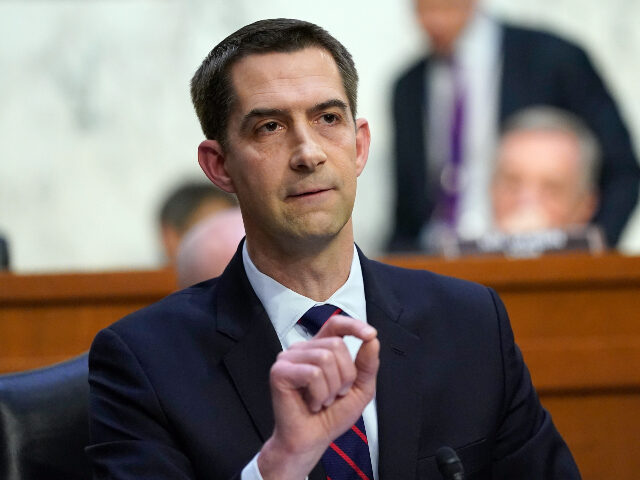The Chinese Communist Party (CCP) deliberately destroyed evidence of the coronavirus stemming from a lab in Wuhan, China, Sen. Tom Cotton (R-AR) said on Thursday in response to a New York Times article asserting that there is still no “smoking gun” to prove it.
“Republicans Push Lab Leak Theory on Covid’s Origins, but Lack ‘Smoking Gun’” reads a March 8 New York Times headline. The article that follows asserts that the first hearing of the House Select Subcommittee on the Coronavirus Pandemic, which took place this week, “produced no new evidence but plenty of political theater.”
“…and it made clear just how difficult it might be to turn up conclusive evidence about whether the virus escaped from a lab or spilled over from animals to humans naturally,” the Times continued.
Cotton, a fierce critic of China, responded to the headline Thursday.
“The Chinese Communist Party destroyed evidence so there may never be a ‘smoking gun.’ But all the available evidence points to a lab leak. There’s a reason why the CCP covered this up,” Cotton explained:
The Chinese Communist Party destroyed evidence so there may never be a "smoking gun."
But all the available evidence points to a lab leak.
There's a reason why the CCP covered this up. pic.twitter.com/DZBe7VBDi5
— Tom Cotton (@TomCottonAR) March 9, 2023
Cotton’s remark comes on the heels of President Biden’s Department of Energy concluding that the coronavirus likely stemmed from a lab leak.
China, however, continues to insist that the communist country has been “open and transparent, and shared information and data on [coronavirus] with the international community in a timely manner.”
Those claims, however, are wholly untrue.
As Breitbart News reported:
In truth, China has consistently destroyed evidence and denied access to vital information, a fact the World Health Organization (W.H.O.) was reluctantly forced to admit after Beijing turned the long-delayed visit by W.H.O. investigators to Wuhan in early 2021 into a stage-managed farce.
W.H.O. formally abandoned the search for the virus’s origins two weeks ago, expressly because China has effectively obstructed the investigation. W.H.O. promised for years to conduct a more thorough follow-up to the disastrous 2021 Wuhan trip, but China prevented it from occurring.
China continues to float the conspiracy theory that the virus’s origins are linked to the U.S. Army laboratory at Fort Detrick, Maryland.
Meanwhile, U.S. health officials — namely, Dr. Anthony Fauci — played a role in initially dismissing the lab leak theory. A March 5 memo sent to members of the Select Subcommittee on the Coronavirus Pandemic found that Fauci, former White House medical adviser and former National Institute of Allergy and Infectious Diseases director, participated in a conference call on February 1, 2020, and was told that the coronavirus may have leaked from a lab. However, it appears Fauci and his allies went on offense, commissioning and approving of a paper attempting to discredit the lab leak theory. He even cited the study from his position at the White House.
“New evidence released by the Select Subcommittee today suggests that Dr. Fauci ‘prompted’ the drafting of a publication that would ‘disprove’ the lab leak theory, the authors of this paper skewed available evidence to achieve that goal, and Dr. Jeremy Farrar went uncredited despite significant involvement,” the memo concluded.
Further, throughout the pandemic, Fauci also insisted on denying that the National Institutes of Health (NIH) funded gain-of-function research in the Wuhan Institute of Virology:
WATCH: Dr. Fauci Caught Lying About NIH Funding in Wuhan https://t.co/GC2vwunrlk
— Rand Paul (@RandPaul) July 20, 2021
“You’re simply saying it doesn’t exist because you changed the definition on the NIH website,” Sen. Rand Paul (R-KY) told Fauci during a November 2021 hearing.
“This is terrible and you’re completely trying to escape the idea that we should do something about trying to prevent a pandemic from leaking from a lab,” he continued.
“And what you’ve done is change the definition on your website to try to cover your ass, basically. That’s what you’ve done, you’ve changed the website to change the definition that doesn’t include the risky research that’s going on,” Paul continued.

COMMENTS
Please let us know if you're having issues with commenting.